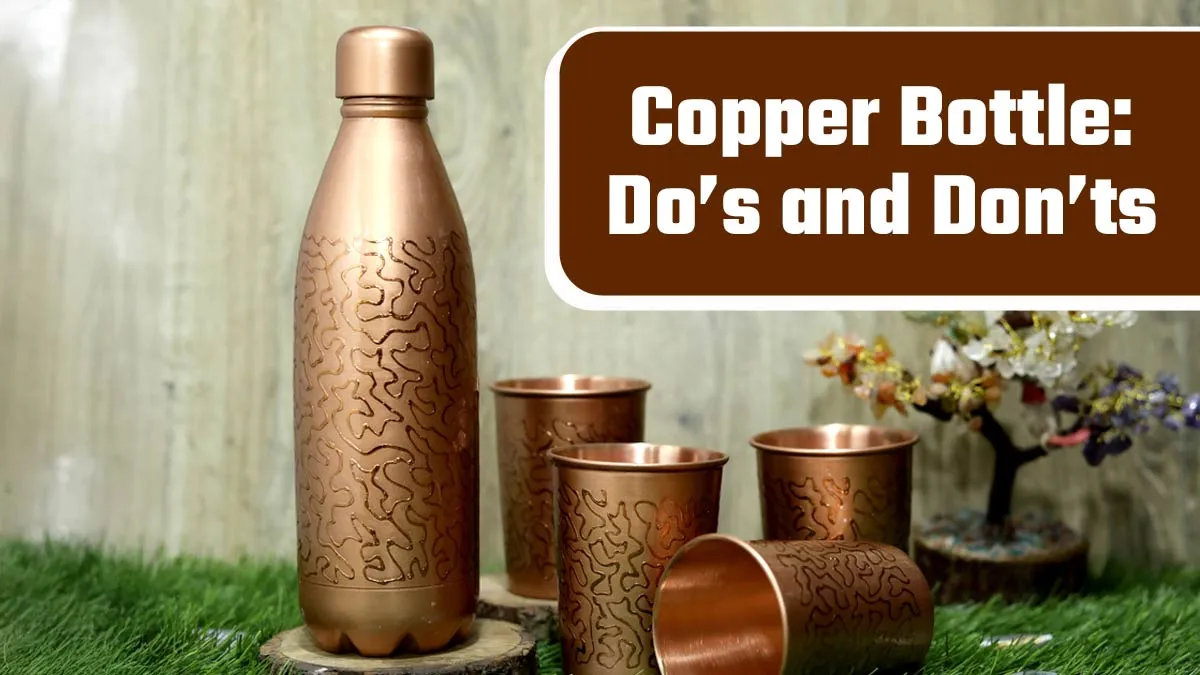
Copper bottles have surged in popularity for their purported health benefits, from boosting immunity to aiding digestion. But as more people adopt this ancient Ayurvedic practice, questions arise about proper usage especially whether storing copper bottles in the fridge is safe. While cooling water in copper vessels might seem harmless, experts warn that improper storage or care could negate benefits or even pose risks. Regarding the same, an expert shared whether is it safe to keep copper bottles in the fridge or not.
Table of Content:-
Is Fridge Storage Recommended For Copper Bottle?
View this post on Instagram
Ryan Fernando, Nutritionist, The Millionaire's Health, Bengaluru, strongly advises against refrigerating copper bottles. “Never store copper bottles in the fridge,” he says. “Temperature fluctuations can cause condensation, which might accelerate metal leaching into the water.” Copper reacts with acidic or cold environments, increasing the chance of excess copper dissolving into your drink. While small amounts of copper are essential for health, overexposure can lead to nausea, cramps, or long-term liver issues.
Copper Bottle Do’s and Don’ts: Ryan Fernando’s Guidelines
Follow these simple rules to use copper bottles safely:
Do’s:
- Hand Wash Only: Use mild soap and a soft sponge to preserve the bottle’s coating.
- Stick to Room-Temperature Water: Copper is stable at moderate temperatures.
- Follow a Usage Cycle: Use the bottle daily for 2-3 months, then take a 1-month break. “This lets your body flush excess copper naturally,” says Fernando.
- Dry Thoroughly: Prevent moisture buildup to avoid oxidation.
Don’ts:
- Avoid Hot Liquids: Heat increases leaching risk.
- Skip the Fridge: Cold storage promotes condensation and metal transfer.
- Never Use Dishwashers: Abrasive cleaning strips and protective coatings.
- Don’t Store Juices or Acidic Drinks: Citrus or vinegar accelerates corrosion.
What Science Says
A study in the Journal of Environmental Health tested copper vessels under different conditions. Researchers found that storing water in copper containers at cold temperatures (4°C/39°F) for over 6 hours increased copper levels by 30% compared to room temperature. Prolonged exposure raised concentrations beyond WHO’s safety limit (2 mg/L).
Why Dishwashers Are a No-Go for Copper Bottles
The expert strongly advises against using dishwashers for copper bottles. “The harsh detergents and abrasive cleaning cycles damage the bottle’s shine and inner lining, making leaching worse,” he explains. These chemicals and scrubbing actions strip the protective coating, increasing the risk of copper seeping into your water. Instead, Fernando recommends hand washing with mild soap and a soft sponge to maintain the bottle’s safety and longevity.
How to Use Copper Bottles Safely
- Morning Ritual: Fill your bottle at night, drink the water by noon, and avoid letting it sit for hours.
- Lemon Water? Think Twice: Acidic drinks corrode copper. Stick to plain water.
- Monitor for Green Stains: Blue-green residue signals oxidation. Scrub gently with lemon and salt (rinse thoroughly afterwards).
- Fernando emphasises moderation: “Copper isn’t a magic bullet. Use it wisely—2-3 months on, 1 month off—to balance benefits and safety.”
Conclusion
Copper bottles can be a healthy addition to your routine, but only with proper care. Refrigeration, dishwashers, and hot liquids are big no-nos, as they heighten leaching risks. By following Ryan Fernando’s science-backed tips—like hand washing, avoiding extreme temperatures, and taking regular breaks—you can safely enjoy copper’s benefits without toxicity fears.
Also watch this video
How we keep this article up to date:
We work with experts and keep a close eye on the latest in health and wellness. Whenever there is a new research or helpful information, we update our articles with accurate and useful advice.
Current Version
